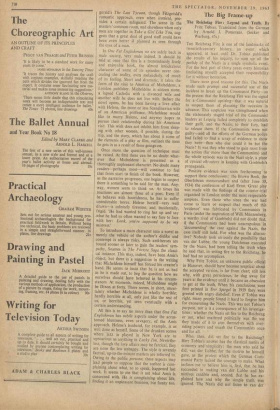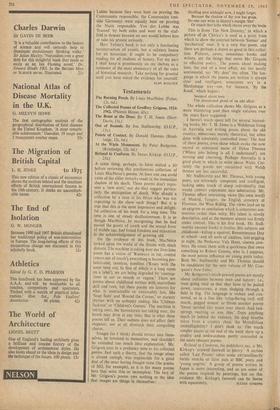The Big Frame-up
The Reichstag Fire : Legend and Truth. By Fritz Tobias. Translated from the German by Arnold J. Pomerans. (Seeker and Warburg, 45s.)
THE Reichstag Fire is one of the landmarks of twentieth-century history, an event which appeared, at least until Dr. Tobias published the results of his inquiry, to sum up all the perfidy of the Nazis in a single symbolic event. For the best part of thirty years every historian (including myself) accepted their responsibility for it without hesitation.
There were good reasons for this. The Nazis made such prompt and successful use of the incident to break up the Communist Party—on the pretext that the Reichstag Fire was the signal for a Communist uprising—that it was natural to suspect them of planning the occasion in advance. This suspicion was strengthened when the elaborately staged trial of the Communist leaders at Leipzig failed completely to establish their guilt, and the Nazis, to their fury, had to release them. If the Communists were not guilty-,--and all the efforts of the German police had failed to find a scrap of evidence to show they were—then. who else could it be but the Nazis? It was they who stood to gain most from the action (far more than the Communists) and the whole episode was in the Nazi style, a piece of cynical effrontery in keeping with Goebbels's propaganda.
Positive evidence was soon forthcoming to support these conclusions: the Brown Book, the Oberfohren memorandum and (after lune 30, 1934) the confession of Karl Ernst.•Great play was made with the findings of the counter-trial organised in London under the most respectable auspices. Even those who since the war had come to learn or suspect that much of this `evidence' was fabricated by Communists in Paris (under the inspiration of Willi Miinzenberg, a worthy rival of Goebbels) did not doubt that, if the Communists had been unscrupulous in 'documenting' the case against the Nazis, the case itself still held. For what was the alterna- tive? Nobody took seriously the possibility that van der Lubbe, the young Dutchman executed by the Nazis, had been telling the truth when he said that, in setting fire to the Reichstag, he had had no accomplices.
Why Fritz Tobias, an unknown public official in Hanover, should have become sceptical about the accepted version, is far from clear; still less why, with great persistence, he dug away for years at the evidence until it became an obsession to get at the truth. When his conclusions were first printed in Der Spiegel in 1959 they were greeted with angry disbelief. Even if Tobias was right, many people found it hard to forgive him for exonerating the Nazis. This Was not Tobias's purpose, nor is it a consequence of his investiga- tions: whether the Nazis set fire to the Reichstag or not, what mattered politically was the use they made of it to arm themselves with over- riding powers and smash the Communists once and for all.
Who, then, did set fire to the Reichstag? Herr Tobias's answer has the classical merits of economy and simplicity: the man who said he did, van der Lubbe, for the motive he himself gave, as the protest which the German Com- munist Party lacked the courage to make. What inclines me to believe him is, first, that he has succeeded in making van der Lubbe and his motives credible and, second, that he has ex- plained how and why the simple truth was ignored. The Nazis did not listen to van der Lubbe because they were bent on proving the Communists responsible; the Communists (out- side Germany) were equally bent on proving the Nazis responsible. Van der Lubbe was 'framed' by both sides and went to the scaf- fold in despair because no one would believe him or take his protest seriously.
Herr Tobias's book is not only a fascinating reconstruction of events, but a salutary lesson for all historians. It ought to be compulsory reading for all students of history. For my part I shall keep' it prominently on my shelves as a reminder of the most elementary of all the rules of historical research: Take nothing for granted until you have tested the evidence for yourself.
ALAN BULLOCK































































 Previous page
Previous page